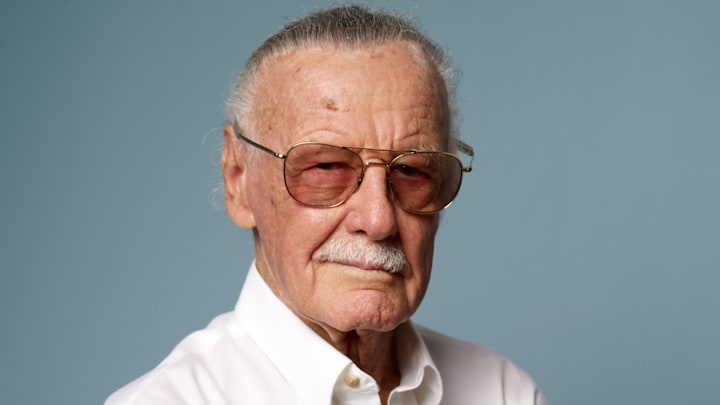Comic book legend Stan Lee’s life was always an open book. The co-creator of some of the greatest superheroes and most beloved stories of all time, Lee—who passed away on November 12, 2018 at the age of 95—became just as mythical and larger-than-life as the characters in the panels. In 2015, around the time of Marvel’s 75th anniversary, Lee had the idea to reflect on his own life, as he said, “in the one form it has never been depicted, as a comic book … or if you prefer, a graphic memoir.”
The result, published by the Touchstone imprint of Simon & Schuster in 2015, was Amazing Fantastic Incredible: A Marvelous Memoir—which was written by Lee with Peter David and features artwork by cartoonist and illustrator Colleen Doran. Here are 10 things we learned about Lee.
1. Stan Lee's wife was also his barber.
As a bit of a throwaway fact, Stanley Martin Lieber (Stan Lee) revealed the secret of his slicked back mane on the second page of his memoir. “My whole adult life, I’ve never been to a barber,” he wrote. “Joanie always cuts my hair.”
2. His mother was one of his earliest and greatest champions.
Lee wrote that as a child he loved to read books by Mark Twain, Sir Arthur Conan Doyle, Jules Verne, H.G. Wells, and others, and his mother often watched him read: “I probably got my self-confidence from the fact that my mother thought everything I did was brilliant.”
3. Lee worked as an obituary writer.

Before writing about the fantastic lives of fictional characters, Lee wrote antemortem obituaries for celebrities at an undisclosed news office in New York. He said that he eventually quit that job because it was too “depressing.”
4. Captain America gave him his first big break.
A week into his job at Timely Comics, Lee got the opportunity to write a two-page Captain America comic. He wrote it under the pen name Stan Lee (which became his legal name) and titled it “Captain America Foils the Traitor’s Revenge.” His first full comic script would come in Captain America Issue 5, which was published August 1, 1941.
5. He wrote Army training films with a handful of other soon-to-be legends, including Dr. Seuss.
After being transferred from the army’s Signal Corps in New Jersey, Lee worked as a playwright in the Training Film Division in Queens with eight other men, including a few who went on to be very famous: Pulitzer Prize-winning author William Saroyan, cartoonist Charles Addams (creator of The Addams Family), It’s a Wonderful Life director Frank Capra, and Theodor Geisel, better known as Dr. Seuss.
6. Lee defied the Comics Code Authority with an anti-drug comic.

In 1971, Lee received a letter from the Department of Health, Education, and Welfare asking him to put an anti-drug message in one of his books. He came up with a Spider-Man story that involved his best friend Harry abusing pills because of a break-up. The CCA would not approve the story with their seal because of the mention of drugs, but Lee convinced his publisher, Martin Goodman, to run the comic anyway.
7. The Hulk's green hue was the result of a printer error.
The character was supposed to be gray, but according to Lee, the printer had a hard time keeping the color consistent. “So as of issue #2,” Lee wrote, “with no explanation, he turned green.”
8. Lee's wife destroyed his prized typewriter.

According to Lee, during an argument, Joanie destroyed the typewriter he used to write the first issues for characters including Spider-Man and The Fantastic Four. “This happened before eBay," he wrote. "Too bad. I could’ve auctioned the parts and made a mint.”
9. A fire destroyed his interviews and lectures.
When Lee moved his family to Los Angeles, he set up a studio in Van Nuys where he stored videotapes of his talks and interviews, along with a commissioned bust of his wife. The building was lost to a blaze that the fire department believed was arson, but no one was ever charged with the crime.
10. His favorite Marvel cameo was based on one from the comics.
Beginning with the first Spider-Man film in 2002, Stan Lee made quick cameos in Marvel films as a service to the fans. He said that his appearance in Fantastic Four: Rise of the Silver Surfer (2007) was inspired by the story of Reed and Sue Richards’ wedding, in which he and artist/writer Jack Kirby attempt to crash the ceremony but are thwarted.
A version of this story ran in 2015; it has been updated for 2023.
